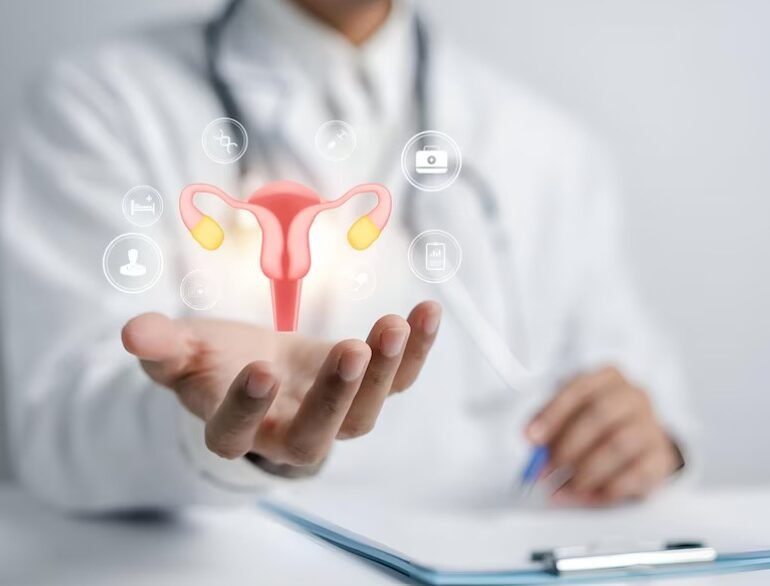Ovarian disorders encompass a wide range of conditions that affect the ovaries, which are essential for the production of eggs and hormones like estrogen and progesterone. These disorders can cause significant discomfort and disrupt a woman’s reproductive health. Understanding the symptoms and seeking timely treatment is crucial to manage these conditions effectively.
Types of Ovarian Disorders
- Polycystic Ovary Syndrome (PCOS)
PCOS is one of the most common ovarian disorders affecting women of reproductive age. It occurs when the ovaries contain numerous small cysts and may be accompanied by hormonal imbalances. Women with PCOS may experience irregular periods, excessive hair growth, acne, and weight gain. PCOS can also impact fertility, making it more difficult to conceive. - Ovarian Cysts
Ovarian cysts are fluid-filled sacs that develop on or within an ovary. Many women may have ovarian cysts without experiencing any symptoms, but in some cases, these cysts can cause pain, bloating, or pressure in the pelvic area. If a cyst ruptures or causes the ovary to twist, it may lead to severe pain and require immediate medical attention. - Ovarian Cancer
Ovarian cancer is a more serious condition that affects the ovaries. Early-stage ovarian cancer often does not show significant symptoms, which makes it difficult to diagnose. As the cancer progresses, symptoms may include abdominal bloating, pelvic pain, changes in bowel habits, and unexplained weight loss. Regular screening and early detection can greatly improve treatment outcomes. - Endometriosis
Endometriosis is a condition where tissue similar to the uterine lining grows outside the uterus, including on the ovaries. This can cause severe pelvic pain, especially during menstruation, and may also lead to infertility. Women with endometriosis may experience pain during intercourse, irregular periods, and chronic fatigue.
Recognizing the Symptoms
The symptoms of ovarian disorders can vary depending on the type of condition. However, some common signs to watch out for include:
- Irregular Periods: If you experience missed periods, heavy bleeding, or periods that are far apart, it could indicate a hormonal imbalance, which is common in conditions like PCOS.
- Pelvic Pain or Bloating: Persistent pelvic discomfort or a sensation of fullness in the abdomen may be a sign of ovarian cysts, endometriosis, or ovarian cancer.
- Pain During Intercourse: Pain during or after sexual intercourse is common in conditions like endometriosis and ovarian cysts.
- Difficulty Conceiving: Ovarian disorders, especially PCOS, can affect a woman’s ability to conceive. If you are struggling with infertility, an evaluation of ovarian health is essential.
- Unexplained Weight Gain or Hair Growth: Excessive weight gain, acne, or increased hair growth on the face and body could be signs of hormonal imbalances, such as those seen in PCOS.
Treatment Options for Ovarian Disorders
The treatment for ovarian disorders depends on the specific condition, severity of symptoms, and whether the woman is trying to conceive. Below are some common treatment options:
- Medications
- Hormonal Birth Control: For conditions like PCOS and endometriosis, hormonal birth control can regulate periods, reduce excess hair growth, and alleviate pelvic pain.
- Pain Relievers: Over-the-counter pain relievers such as ibuprofen can help manage mild to moderate pelvic pain caused by ovarian cysts or endometriosis.
- Fertility Treatments: If infertility is a concern, medications like Clomid or fertility injections can stimulate ovulation and improve the chances of conception.
- Surgery
- Laparoscopic Surgery: For women with endometriosis or large ovarian cysts, laparoscopic surgery is a minimally invasive procedure to remove or treat the problematic tissue.
- Ovarian Cyst Removal: In cases of persistent or symptomatic ovarian cysts, the cyst may need to be surgically removed to prevent complications.
- Oophorectomy: In cases of ovarian cancer or severe ovarian disorders, an oophorectomy (removal of one or both ovaries) may be necessary.
- Lifestyle Changes
Maintaining a healthy weight, engaging in regular physical activity, and eating a balanced diet can help manage symptoms of ovarian disorders, particularly in conditions like PCOS. - Fertility Treatments
For women who wish to conceive but are struggling due to an ovarian disorder, treatments like In vitro fertilization (IVF) or egg freezing can offer viable options to pursue parenthood.
Consult Dr. Shweta Mendiratta for Expert Care
If you’re experiencing symptoms of an ovarian disorder, it is essential to seek medical attention from a specialist who can accurately diagnose and provide personalized treatment options. Dr. Shweta Mendiratta, one of the leading gynecologists in Faridabad, is renowned for her expertise in managing ovarian health and treating various gynecological conditions. With her compassionate care and commitment to women’s health, Dr. Mendiratta ensures that each patient receives the highest standard of treatment.
Visit https://drshwetamendiratta.com/ for more information and to book a consultation with Dr. Shweta Mendiratta, the best gynecologist in Faridabad.
Conclusion
Ovarian disorders can be challenging, but with the right support and timely treatment, women can manage their symptoms and maintain a healthy lifestyle. Recognizing the symptoms early and consulting a skilled gynecologist like Dr. Shweta Mendiratta can significantly improve your quality of life and overall health. If you suspect you have an ovarian disorder, don’t wait—take action now for a healthier future.





